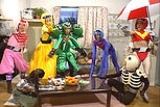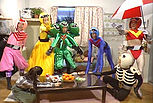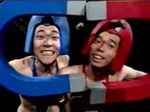
Downtown no Gottsu Ee Kanji
Encyclopedia
Downtown no Gottsu Ee Kanji (ダウンタウンのごっつええ感じ), translated as Downtown's Feelin' Real Good, was a Japan
ese variety show
. It premiered on December 8, 1991 and ended its run on November 2, 1997. It aired on Fuji Television
every Sunday night. Hosted by the comedy duo Downtown
(consisting of Masatoshi Hamada
and Hitoshi Matsumoto
), it had several other owarai
geinin (comedians) in its regular cast.
Like most other Japanese variety shows, it featured guest interviews and games, but it is best known and remembered for its sketch comedy
. Downtown and other cast members would dress in costumes and perform absurd
skits with bizarre characters.
 Seikimatsu Sentai Gorenjai
Seikimatsu Sentai Gorenjai
Mr. BATER
 Hōkago Denshiha Kurabu
Hōkago Denshiha Kurabu
Tokage no Ossan
Shota
Japan
Japan is an island nation in East Asia. Located in the Pacific Ocean, it lies to the east of the Sea of Japan, China, North Korea, South Korea and Russia, stretching from the Sea of Okhotsk in the north to the East China Sea and Taiwan in the south...
ese variety show
Variety show
A variety show, also known as variety arts or variety entertainment, is an entertainment made up of a variety of acts, especially musical performances and sketch comedy, and normally introduced by a compère or host. Other types of acts include magic, animal and circus acts, acrobatics, juggling...
. It premiered on December 8, 1991 and ended its run on November 2, 1997. It aired on Fuji Television
Fuji Television
is a Japanese television station based in Daiba, Minato, Tokyo, Japan, also known as or CX, based on the station's callsign "JOCX-DTV". It is the flagship station of the Fuji News Network and the ....
every Sunday night. Hosted by the comedy duo Downtown
Downtown (owarai)
is a Japanese comedy duo from Amagasaki, Hyōgo consisting of and . Formed in 1982, they are one of the most influential and prolific kombi in Japan today...
(consisting of Masatoshi Hamada
Masatoshi Hamada
is a Japanese comedian best known as the tsukkomi half of the popular owarai duo Downtown alongside Hitoshi Matsumoto. His nickname is Hama-chan , and is married to Natsumi Ogawa...
and Hitoshi Matsumoto
Hitoshi Matsumoto
, or Matchan as he is commonly known, is a Japanese comedian best known as the boke half the popular owarai duo Downtown alongside Masatoshi Hamada...
), it had several other owarai
Owarai
is a broad word used to describe Japanese comedy as seen on television. The word owarai is the honorific form of the word warai, meaning "a laugh" or "a smile". Owarai is most common on Japanese variety shows and the comedians are referred to as owarai geinin or owarai tarento...
geinin (comedians) in its regular cast.
Like most other Japanese variety shows, it featured guest interviews and games, but it is best known and remembered for its sketch comedy
Sketch comedy
A sketch comedy consists of a series of short comedy scenes or vignettes, called "sketches," commonly between one and ten minutes long. Such sketches are performed by a group of comic actors or comedians, either on stage or through an audio and/or visual medium such as broadcasting...
. Downtown and other cast members would dress in costumes and perform absurd
Absurdism
In philosophy, "The Absurd" refers to the conflict between the human tendency to seek value and meaning in life and the human inability to find any...
skits with bizarre characters.
Recurring Sketches and Characters
AHO AHO MAN- Translates to English as Moron Moron Man. A fecal-filled-underwear-wearing superheroSuperheroA superhero is a type of stock character, possessing "extraordinary or superhuman powers", dedicated to protecting the public. Since the debut of the prototypical superhero Superman in 1938, stories of superheroes — ranging from brief episodic adventures to continuing years-long sagas —...
(played by Matsumoto) who has to save a young boy named Kentarō (played by Hamada) from the evil Ohoho Aliens. As his name suggests, he shows little intelligence or common sense and constantly pulls out useless "aho aho items" that have no effect on the villains. In the end, Kentarō loses his temper over the hero's ineptitude and defeats the aliens himself.

- Translating to English as End of Century Heroes Five Range-i, it is a parody of Himitsu Sentai Gorenger -- the last syllable in renjaa ("ranger") is replaced to avoid copyright issues. Each episode begins with the evil Dokuro Kamen ("Skull Mask", played by Hamada) attacking a woman (played by YouYou (actress)You is a Japanese model, television personality, singer and actress.She began her career as a singer, releasing her first single "chotto dake" in 1985. She next formed the Japanese pop group Fairchild in 1988, with Seiji Toda and Hirokazu Kawaguchi, serving as vocalist and songwriter...
) in her home. The sentaiSentaiin Japanese language is a word for a military unit and may be literally translated as "squadron", "task force", "group" or "wing". The terms "regiment" and "flotilla", while sometimes used as translations of Sentai, are also used to refer to larger formations....
heroes, the five renjai, then burst into the scene one at a time to save her and attempt to fight Dokuro Kamen, who is too distracted and unable to fight due to their appearances.
- In the first episode, they have three red renjai and two yellow (breaking the usual sentai convention of having each hero in a different colour). Dokuro Kamen lectures them and tells them to try better next time. Each subsequent episode has Dokuro Kamen attacking the same woman in the same room (often stopping for a friendly chat with the lady's friend before he attacks her), and the renjai appearing in mismatched costumes -- such as Tiger MaskTiger Maskis a Japanese manga series written by Ikki Kajiwara and illustrated by Naoki Tsuji. The series was first published in Kodansha's Bokura Magazine from 1968 to 1969 and was later published in Weekly Shōnen Magazine from 1970 to 1971...
, Falkor, and a waitress from a No-panNo-pan kissaNo-pan kissa is a Japanese term for cafes where the waitresses wear short skirts with no underwear. The floors, or sections of the floor, are often mirrored.-Concept:...
Shabu shabu-- or ridiculously modified versions of their uniforms. The episodes end with Dokuro Kamen scolding the renjai, pointing out exactly what is wrong, and sending them off home.
Mr. BATER
- Matsumoto plays an American living in Japan, Mr. Bater (hailing from OklahomaOklahomaOklahoma is a state located in the South Central region of the United States of America. With an estimated 3,751,351 residents as of the 2010 census and a land area of 68,667 square miles , Oklahoma is the 28th most populous and 20th-largest state...
), who wears glasses and a white suit and speaks in the kansaiKansaiThe or the lies in the southern-central region of Japan's main island Honshū. The region includes the prefectures of Mie, Nara, Wakayama, Kyoto, Osaka, Hyōgo, and Shiga. Depending on who makes the distinction, Fukui, Tokushima and even Tottori Prefecture are also included...
dialect. In each episode, he enters a small business (such as a clothing store, barber, and jewelry store) always run by the same clerk (played by Kōji Imada), a well-meaning but dim-witted man who never speaks. Mr. Bater claims he is on his way to a party and makes a simple request, such as meat for a barbecue, or a new pair of shoes. The clerk mishears or misinterprets his requests and brings him the wrong item, e.g. a jyūtan (carpetCarpetA carpet is a textile floor covering consisting of an upper layer of "pile" attached to a backing. The pile is generally either made from wool or a manmade fibre such as polypropylene,nylon or polyester and usually consists of twisted tufts which are often heat-treated to maintain their...
) instead of gyūtan (beef tongueBeef tongueBeef tongue is the tongue of a cow. The human consumption of beef tongue dates back to the days of Paleolithic hunters, who preferred the fatty portions of the carcass including tongues, as well as organs, brains, feet, and marrow. Beef tongue is very high in fat, at almost 75% of its calories...
). Mr. Bater plays the clown for a brief moment and goes along with it (called norittsukomi), until he snaps back into "straight man" mode and angrily points out the clerk's mistake. This repeats until Mr. Bater finally gets fed up and storms out, as the clerk smiles at the camera. "Bater" is a foreign sounding pronunciation of the Japanese word "Beta," which means lame. Matsumoto also frequently mentions Imada's real life sexual escapades in passing, resulting in a very flustered Imada.

- Translating to English as After School Electromagnetic Wave Club, this sketch features Kōji Imada and Kōji Higashi as "North PoleNorth Magnetic PoleThe Earth's North Magnetic Pole is the point on the surface of the Northern Hemisphere at which the Earth's magnetic field points vertically downwards . Though geographically in the north, it is, by the direction of the magnetic field lines, physically the south pole of the Earth's magnetic field...
" and "South PoleSouth Magnetic PoleThe Earth's South Magnetic Pole is the wandering point on the Earth's surface where the geomagnetic field lines are directed vertically upwards...
," wearing nothing but helmets and revealing thongsThong (clothing)The thong is a garment generally worn as either underwear or as a swimsuit in many industrialized societies around the world. It may also be worn for traditional ceremonies or competitions such as sumo wrestling...
and holding giant U-shaped magnets. They act like characters in an after school specialAfter school specialThe American Broadcasting Company coined the term after school special in 1972 with a series of made for television movies, usually dealing with controversial or socially relevant issues, that were generally broadcast in the late afternoon and meant to be viewed by school age children, particularly...
, teaching the viewers business world manners. The magnets, as they proclaim, are used to "draw out evil." Due to their skimpy attire, a mosaicMosaicMosaic is the art of creating images with an assemblage of small pieces of colored glass, stone, or other materials. It may be a technique of decorative art, an aspect of interior decoration, or of cultural and spiritual significance as in a cathedral...
is often applied over their groins whenever there is wardrobe malfunctionWardrobe malfunctionA wardrobe malfunction is a euphemism for accidental exposure of intimate parts. It is different from flashing, as the latter implies a deliberate exposure...
.
- Imada and Higashi's outrageous appearances have caused screenshots of their characters to be widely circulated on the InternetInternetThe Internet is a global system of interconnected computer networks that use the standard Internet protocol suite to serve billions of users worldwide...
.
Tokage no Ossan
- Translating to English as Old Man Lizard, Matsumoto plays a lonely half-lizardLizardLizards are a widespread group of squamate reptiles, with nearly 3800 species, ranging across all continents except Antarctica as well as most oceanic island chains...
, half-middle aged man who lives in the park. A young boy named Masa (played by Hamada) feeds him on a regular basis. When Masa reveals he has less time for the lizard man now that he has a petPetA pet is a household animal kept for companionship and a person's enjoyment, as opposed to wild animals or to livestock, laboratory animals, working animals or sport animals, which are kept for economic or productive reasons. The most popular pets are noted for their loyal or playful...
dogDogThe domestic dog is a domesticated form of the gray wolf, a member of the Canidae family of the order Carnivora. The term is used for both feral and pet varieties. The dog may have been the first animal to be domesticated, and has been the most widely kept working, hunting, and companion animal in...
, the lizard man tries to convince him to let him live in his house as a second pet. The first episode of "Tokage no Ossan" was broadcast simultaneously during a major sporting event, so Downtown simply ad-libbed most of the dialogue and worked quite loosely with the long sketch out of the expectation that nobody was watching anyway, but it eventually became famous enough to warrant repeat episodes.
Shota
- Itsuji Itao plays a man attending the funeral services for a young boy named Shota (Matsumoto). Unbeknownst to everyone else at the service, Shota, oblivious to his recently departed status, is bored and appears before Itao and asks if he wants to play. Itao initially refuses, trying to tell Shota that he is dead. Somehow, Shota's pranks appear to happen in real life. Itao tries to cover up Shota's pranks by playing along, such as singing on a mini-karaoke machine Shota produces, making noises when Shota sets off some firecrackers, and even engaging in a wrestling match with a monk. The pranks get increasingly erratic, perturbing the bereaved family (Hamada and You) and the monk performing the service. The skit ends with Itao having driven everyone away from the funeral.

